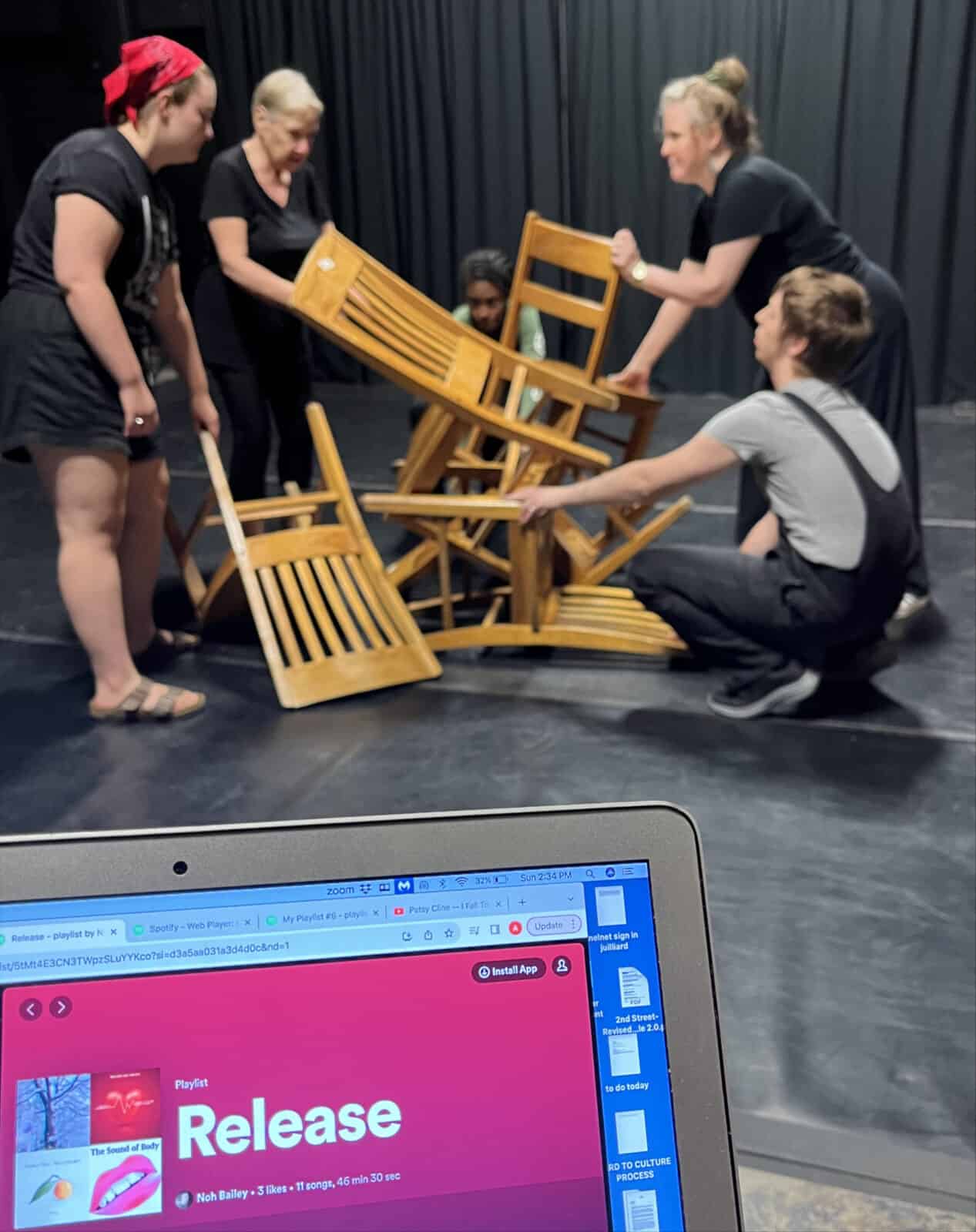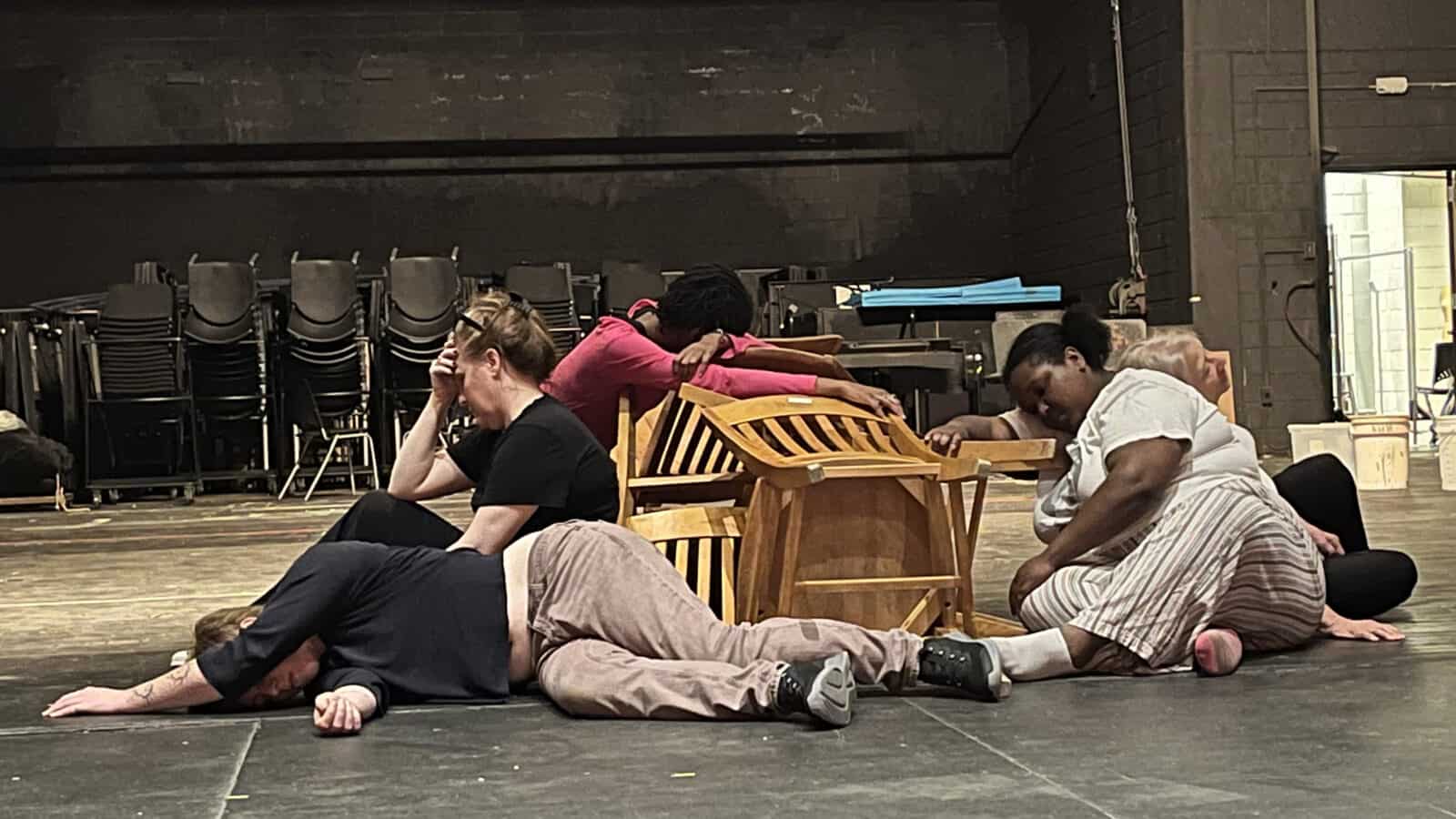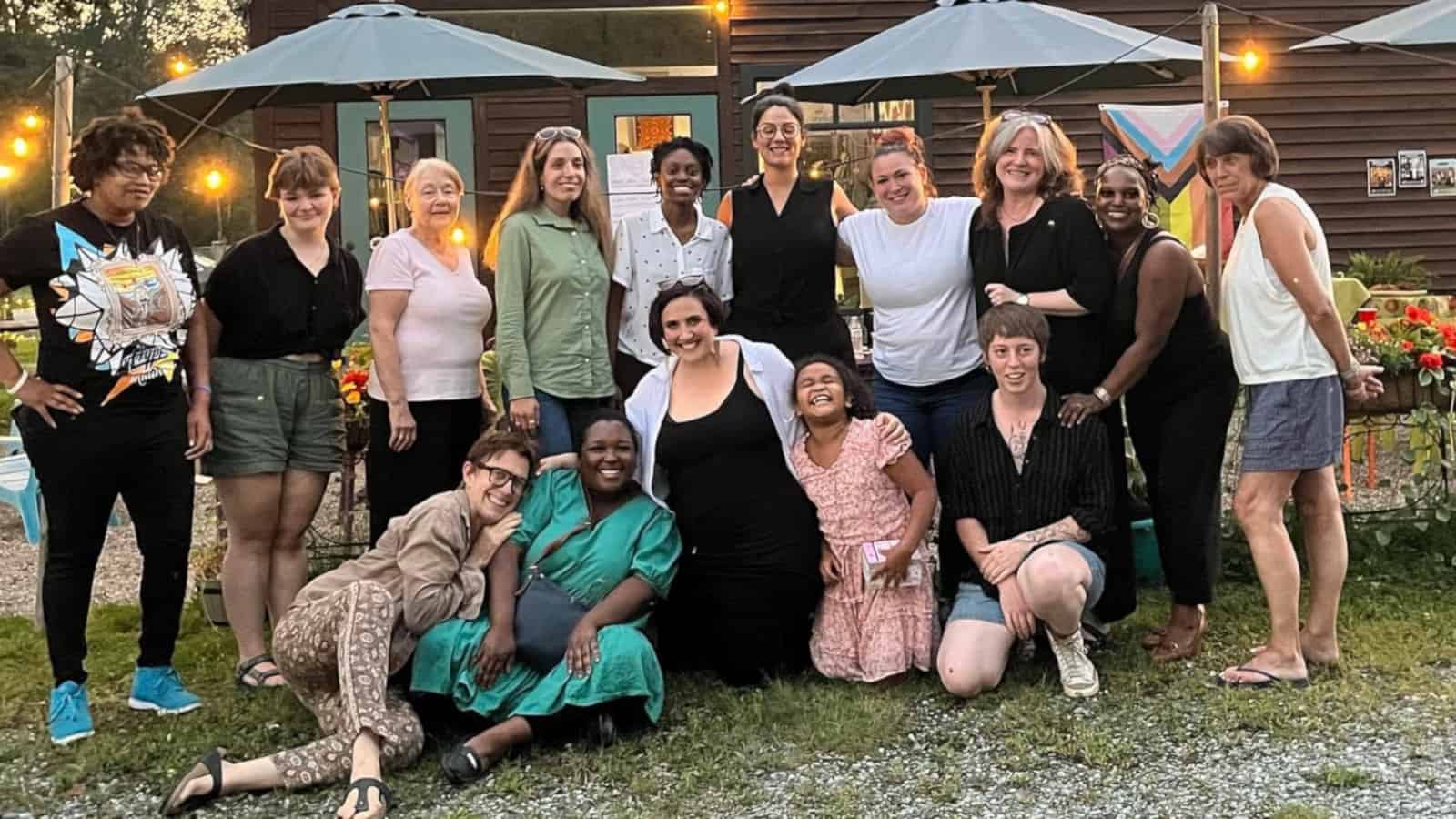‘I would have kayaks … I may not touch the fish … I will catch it , but I won’t clean it and cook it because … we live in Pittsfield.’
On a spring evening, a woman imagines floating on the Housatonic, watching for brook trout in the sun, otter slides on the bank, great blue heron. And she has lived where she could not come outside or see the sky.
In Release, a cooperative of women creators with the 2nd Street program in Pittsfield share their strength, their pain and their dreams. A new play opens today and tomorrow at Berkshire Community College, a work of devised theater directed and envisioned by Berkshire theater makers Sara Katzoff and Amy Brentano.
‘I want to jump forward. Move forward. Not dwell on my past. Not let it change my entire mind state. I want to feel things. To experience things, to care about things. All the color that left the world. I want to create color. I want to smell and taste, to feel. To see — I want to see shapes, movement …’
2nd Street works with people who have been incarcerated, Brentano said, with housing, jobs, addiction recovery. She talked by phone from her performance space at the Foundry in West Stockbridge as she prepared for their final rehearsals.
‘I want to jump forward. Move forward. Not dwell on my past. Not let it change my entire mind state. I want to feel things. To experience things, to care about things. All the color that left the world.’ — Release
2nd Street is a new nonprofit, she said — they celebrated their first year in midsummer. She and Katzoff have come to know them since last spring, when Mark Gold, the board chair, reached out to them.
2nd Street is evolving programs to incorporate the arts, she said, to give people ways to express their stories, and they were looking for leaders for a new theater program.
So they have come to work with eight women and to lift their voices, so people can hear them as a friend, neighbor, family, a whole and strong person, with a sense of humor and a will to survive.
“Getting to know them has been an inspiration,” she said.

The cast of Release rehearse at the Foundry in West Stockbridge.
She and Katzoff began talking with them in April, she said. The women who have become the voices of the play would meet once a week at 2nd Street for a support group, and Katzoff and Brentano would meet with them before or afterward, to respect their time.
“The conversations would take off,” Brentano said. “This is a world the wider community often doesn’t want to know. They’re generous, and they want to share their stories.”
Origins of trauma
They would talk in blunt words about the violence they lived through when they were young, she said — often violence they lived with for years. Many of their stories are stark. The play will make clear in their words the real pain and fear of these lived experiences, when someone lives shut down, restricted, assaulted, beaten, violated, abused.
“I was adopted when I was three years old. My parents were on drugs so DCF took us away.”
“Sara and I would leave stunned,” she said. “… We heard a lot of childhood trauma.”
“I never knew how to cook. Like holidays? I never cooked nothing. We have no traditions, nothing. I can’t think of one happy holiday in my entire life.”
Many of them ran away and had nowhere to go. Many have lived homeless. Many are in recovery from addiction, Brentano said. They have had a catalyst of one kind or another to get clean, and they have moved forward with determination.
Recovery isn’t linear, she said, and they are seeking and finding ways to reconnect with nature, with people, even people they may have hurt in the past, and to change their lives. They share dreams and accomplishments, she said. One in culinary school now, one renovating a house, one working through nonprofits with people who struggle with experiences she knows from the inside.
Brentano and Katzoff want to hold and offer their stories honestly, she said, to break stereotypes and to show the lack of resources that have often contributed.
A diverse cast of makers
They have drawn in a group of Berkshire actors to perform, out of respect Brentano said. The women who work with them as creators are sharing vulnerable stories, and to speak on stage as themselves would add another kind of pressure.
Given the time they have all had to work with, it was also hard for the storytellers to rehearse intensively at this moment in their lives, as they are working, going back to school, rebuilding. From their conversations, Brentano and Katzoff have worked with them to evolve a script.
And many of the actors or their families have lived experiences, she said, that help them to relate. Three Williams students also joined them late in the spring semester, taking a course on documentary film, and recorded their conversations with permission.
‘I don’t honestly think I’d have stayed sober without her, with all the stuff I’ve been through. She’s my joy.’ — Release
The voices are distinct and clear but not identifiable, Brentano said, and the actors are not playing individual characters, a choice she and Katzoff have made to protect the storytellers, to respect their experiences and their courage in their new lives.
In late spring they came to the Foundry to meet the actors, she said. They all talked together and all sat down to dinner. They have gathered a diverse cast in many ways, and one storyteller and one actor are mother and daughter, though Brentano and Katzoff did not know that at first — they knew the actor for her theater work and reached out to her.
She recognized her mother’s voice in the script, Brentano said. And she has seen family as a throughline in many of the stories she and Katzoff and the storytellers are weaving together here. Many of them have experiences as mothers.
Family love and loss
These often seemed to be some of the hardest for them to share, Brentano said. Some parts of their stories they have had to tell before to case workers, Brentano said — they have developed ways to present hard experiences when they needed to, and they could talk matter-of-factly — until they talked about their children.
One has a young daughter and speaks of her with love.
“She came a month early. In the beginning she was so small, I had to supplement formula and breast milk every hour around the clock. … I don’t honestly think I’d have stayed sober without her, with all the stuff I’ve been through. She’s my joy.”
The storytellers talk about love for their children, and for some the pain of losing a child, and for some the pain of knowing that in earlier times, they could not be there for their children. Many of they do not have families, a mother, anyone who could take in a child, Brentano said, or someone they would trust.
One has photographs at home of the son who now has a loving home, she says, with an adoptive family. She wears his footprint tattooed on her skin. And she speaks of deep loss as she reckons with the choices she has made and their consequences.
‘I see my son around town. Am I able to talk with him? No. And when he’s 18 years old, if wants to meet me, I wanna be like, ‘hey, it was never that I didn’t want you …’ — Release
“I see my son around town. Am I able to talk with him? No. And when he’s 18 years old, if wants to meet me, I wanna be like, ‘hey, it was never that I didn’t want you, it was always because I wasn’t ready.’ I made a mistake and I thought that I could be a mom and I couldn’t. I didn’t realize that I was selfish and I just did what I wanted to do. I didn’t really think about anything outside me, but I loved him.”
Addiction can blind someone to the pain they are causing themselves and others, the storytellers say — one wakes up to the realization that she is acting in the way her mother acted toward her, something she swore she would never do.
Realities of confinement
And incarceration can divide families in more than one way, Brentano said. Women have no place to be incarcerated here, and many of the storytellers were sent to Chicopee, too far to see their families or their children, and with no way to provide for them.
“… two years by myself 50 miles from home. No letters, no visits, no nothing.”
They spoke to her more about the past and the future than about these experiences, she said, but Release touches on them — the confinement, the isolation, the humiliation and lack of choice.
‘Two years by myself 50 miles from home. No letters, no visits, no nothing.’ — Release
“We don’t really get to do much. You know what I mean? I run back and forth in my cell over and over and over. If I do it six hundred times that’s a mile. So I go back and forth in my six foot cell, back and forth, back and forth, back and forth running around in here. I’ve been a runner all my life.”
Being clean becomes a luxury. A woman with her period can’t even get anything for the blood.
“Even if you have a job in here, it’s not enough to buy what you need … shampoo, soap, toilet paper, toothpaste.”

The cast of Release rehearse at the Foundry in West Stockbridge.
And realities of release
And after these repeated challenges, the storytellers are here, now, determined to to rebuild, and asking how to create trust — how to reconnect with themselves, with their own bodies, with people and community and life around them. They share a need with a sense of clear urgency.
One recalls a time when she got clean she got a job caring for children, working for a woman who fostered rescue horses.
“A beautiful gray Percheron mare who was so broken and damaged came off the trailer. She was mean … and huge. 17 hands. An old Amish working horse who plowed and pulled carriages for twenty years and they just threw her away. …
“I renamed her Khaleesi. She bit and kicked. Wouldn’t let you touch her legs. It took me so much time to gain her trust. I remember the first time she ever walked up to me instead of me approaching her.”
The mother with her young infant imagines a future for her daughter that can be wider than her own.
“When I was a teenager I wanted to be a firefighter, I got into this program at a Firefighting Academy, but my adopted father would not allow me to do it because I was a girl. It totally crushed me. For a long time I didn’t want to be a woman. I started wearing baggy clothes. I cut all my hair off. … I hated being a woman.
“I want my daughter to know she can be anything she wants. We have a lot to learn together.”
‘I will be the voice’
One woman has reached out to people going through some of what she herself wrestles with. She lost her hearing at a year and a half from scarlet fever. She was 30 before she met anyone in the deaf and hard of hearing community
‘I went back to school for Deaf Culture Studies. I remember asking my professor, ‘how do I fit in?’ And she said, ‘the worst thing to be is a hard of hearing person, because you’re caught between the hearing and the deaf world. Cross culture.’ That threw me for a loop. It made me angry. I stopped going to class. I didn’t finish school.’
She is involved in this kind of work now, Brentano said, working in prisons and with mothers of deaf and hard of hearing children
“She’s doing incredible work,” Brentano said.
The play will bring in her voice visually, Brentano said, because she and Katzoff could not find a deaf or hard of hearing actor in the time, and they felt it would not be respectful to have a hearing actor speak for her.
“I will be the voice of something. … I will be the voice of other women. … I will be the voice of deaf and hard of hearing women.
A voice to switch up the way people view you.
A voice so you know you’re not alone.”

